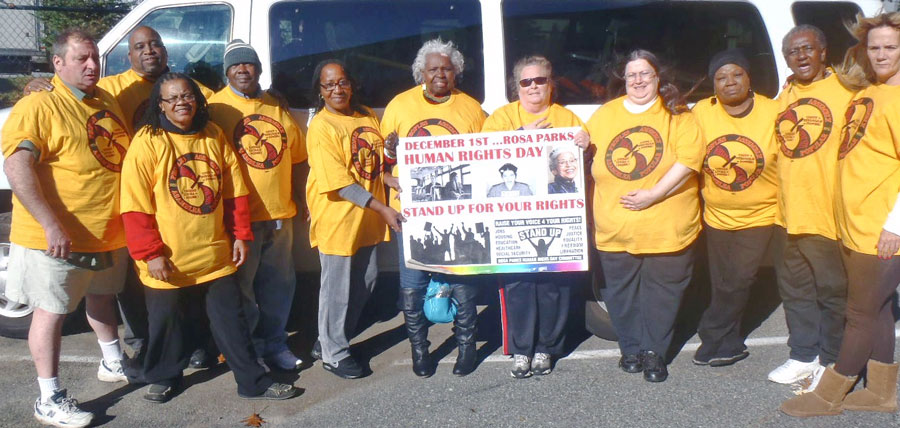

Rhode Island organizers after a planning meeting.
Providence, R.I. — On Saturday, Dec. 1, the Rhode Island Rosa Parks Human Rights Day Committee will hold its seventh annual event commemorating Parks’ Dec. 1, 1955, refusal to move to the back of the bus in Montgomery, Ala. In defiance of the Jim Crow segregation of the city’s public transportation system, Parks’ action led to the victorious Montgomery Bus Boycott.
The day begins at 1 p.m. with a rally in Providence’s South Side, on Broad Street in front of Central High School. At 2:30 p.m., a re-enactment of Parks’ refusal to move from her seat will take place, and at 3 p.m., a reception will take place inside the DARE [Direct Action for Rights and Equality] office at 340 Lockwood St.
While saluting Parks’ act of courage, the RI RPHRD Committee also reminds everyone of the many collective coordinated efforts of the Montgomery NAACP, the Montgomery Womens Council, the Black churches — led by a young pastor, Dr. Martin Luther King Jr., and by the Black masses by the thousands, who all organized and participated in the boycott.
The historic boycott lasted 382 days. It ended on Dec. 20, 1956, when the Supreme Court declared segregation on public buses to be unconstitutional.
Along with Emmett Till’s murder in August 1955, the Montgomery Bus Boycott helped birth the Civil Rights Movement, which eventually led to the abolition of legal segregation in transportation, public places and accommodations, housing, and access to the ballot box.
Dr. Martin Luther King Jr. rose to assume the weighty responsibility of being the movement’s most recognized and influential leader. King recognized that the struggle for civil rights must be combined with the struggle for economic rights. It was support for a strike by low-wage sanitation workers which drew him to Memphis, where he was assassinated in 1968. King added a third prong, against militarism and war, to his platform in 1967, when he came out against the Vietnam War, comparing the military budget to a “demonic suction tube” drawing away the people and resources needed to fight the war on poverty at home.
The Rosa Parks Human Rights Committee cautions that a giant struggle is looming to beat back a massive attack on 75 years of social and economic progress, including Social Security, Medicaid and Medicare, human needs programs, and civil rights and civil liberties.
The committee urges everyone to stay vigilant and learn the lessons that Rosa Parks and Dr. King taught us: combine individual courage with a high level of organization; do broad and deep outreach and education among the masses of poor and working peoples and their organizations; use a creative combination of direct action and mass mobilization; and expose the links between racism, poverty and war, and fight them together as three heads of the same beast.
First Secretary of Workers World Party This International Workers Day is anything but normal This…
Supporters of political prisoner Mumia Abu Jamal hosted a vibrant and revolutionary program in honor…
Chapters of Students for Justice in Palestine (SJP) jointly organized a demonstration in New York…
U.S. imperialism suffered its second historical defeat in history on April 30, 1975, at the…
In a video that has gone viral on social media, the FBI and Michigan state…
Workers World Party salutes the 50th anniversary of the stunning victory of the long struggle…